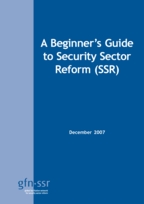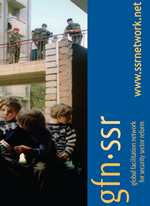
Security Sector Reform in Kosovo
After nine years under international administration, Kosovo declared independence in February 2008. Subsequent international and local discord has ensured that the provisions for independence as outlined in the Ahtisaari Plan have not been endorsed by the United Nations Security Council, calling into question the nature of future international engagement.
By extension, it remains unclear how security sector reform (SSR) will proceed in the newly declared independent state, and under what leadership. Much remains to be done. Those justice and security institutions that have been established, including the Kosovo Police Service (KPS), are in their infancy and face numerous challenges. For instance, a variety of parallel institutions exist, that is, institutions that provide some type of service to local communities, but nevertheless remain outside the jurisdiction of the Government in Pristina. Institutions such as KPS were developed under executive direction of the international community.
Apart from police and judiciary functions, no indigenous security institutions have been established. Their creation was intended to be tackled once Kosovo’s status was settled. External defence has been the preserve of NATO’s Kosovo Force (KFOR), for instance. The establishment of a Kosovo Army would have been indigestible to Serbia. The concept of security sector reform in Kosovo is therefore somewhat misleading, since all security-related institutions have been built almost from scratch within a new state with no residual capacity for governing the security sector.
The European Union’s rule of law mission, EULEX, which is being deployed at the moment, was intended to take over and in the process adopt several of UNMIK’s functions. It was designed to reflect lessons learned from the previous nine years, becoming the Union’s largest mission to date at 3,000 personnel, tasked to mentor, monitor and advise in the areas of police, justice, customs and corrections. It was designed to be guided by the principle of local ownership and under a two year initial mandate.
Many questions are unanswered and the future of Kosovo is at once unclear and opportune: lessons learned elsewhere in the region, combined with the attention and resources of the international community, could offer the components for successful transition. There is also the opportunity for the Government of independent Kosovo to take the initiative as the international community remains hamstrung by political differences, establishing a genuinely locally-driven reform process. Nonetheless, both global and local politics threaten to impede success.
This brief is based on the article ‘Kosovo at a Crossroads: the Future of Security Sector Reform’ to be published in an edited volume later in the year by the Hellenic Foundation for European and Foreign Policy (ELIAMEP).
Written by Peter Albrecht, Danish Institute for International Studies, and Alex Dowling, DCAF.
Useful links for SSR in Kosovo
- UNMIK
- UNDP
- KFOR
- OSCE
- European Union in Kosovo
- European Union Planning Team for Kosovo
- SEESAC
- Centre for Civil-Military Relations (CCMR)
- Office of the Prime Minister of the Republic of Kosovo
- Kosovo Police Service
- Western Balkans Parliamentary Forum on Small Arms and Light Weapons
- Saferworld
GFN-SSR Document Library
The Document Library contains links to a number of SSR related documents either focussing specifically on SSR in Kosovo or looking at the country alongside others as a case study. A selection of these are listed below:
- Enhancing civilian management and oversight of the security sector in Kosovo
- Kosovo’s internal security sector review: Stages I&II (Strategic environment review & security threats analysis) – Initial Findings
- Laws Without Policy – Waste, Dead Letter and Futility
- Small arms and human security in Kosovo: An agenda for action
- The Internal Security Sector Review: the future of Kosovo’s security sector?
- Intelligence Agencies of Kosovo: Dismantling, Osmosis, Or Integration?
- Administration and Governance in Kosovo: Lessons learned and lessons to be learned
- Security Sector Governance in the Western Balkans: Self-Assessment Studies on Defence, Intelligence, Police and Border Management Reform
- Policing the Peace: Police Reform Experiences in Kosovo, Southern Serbia and Macedonia









